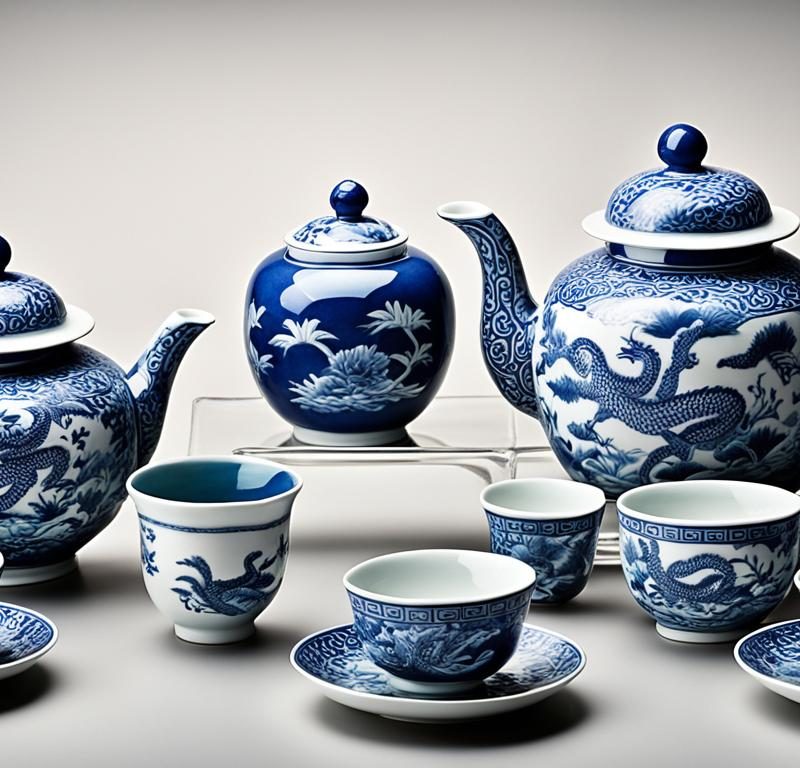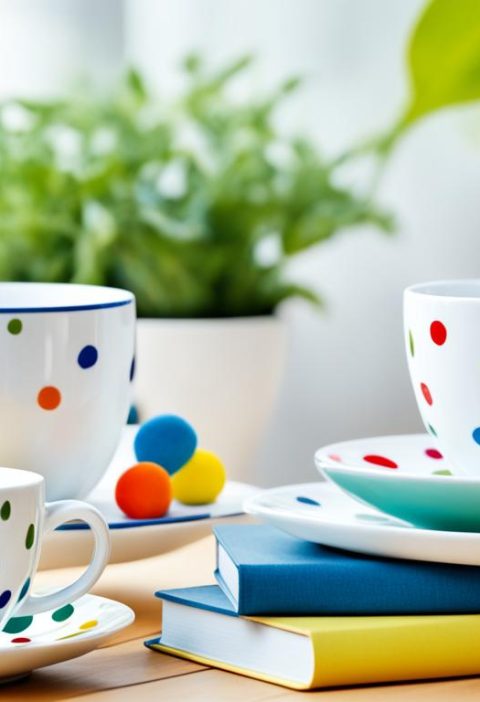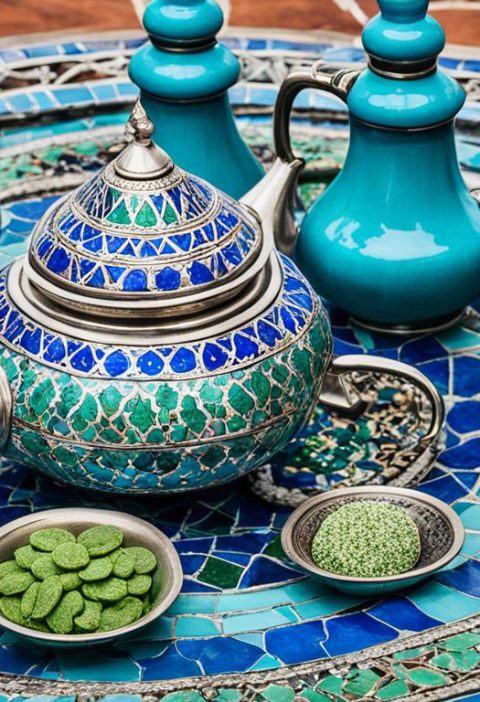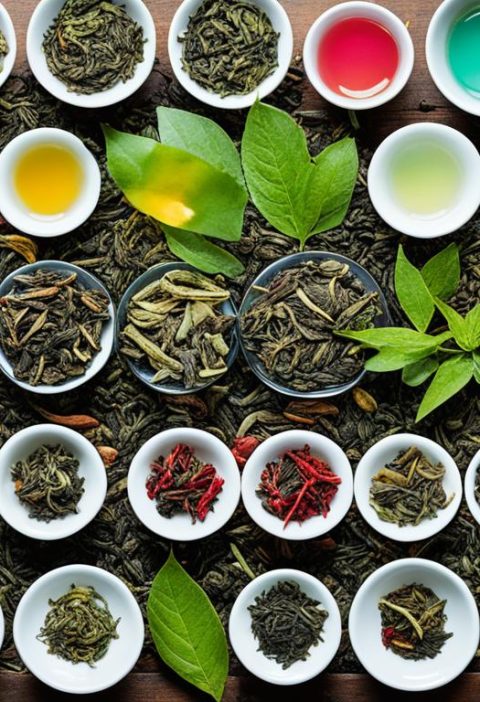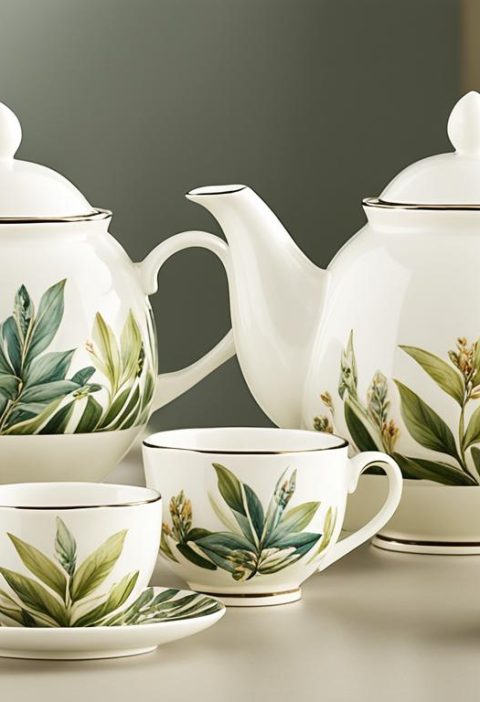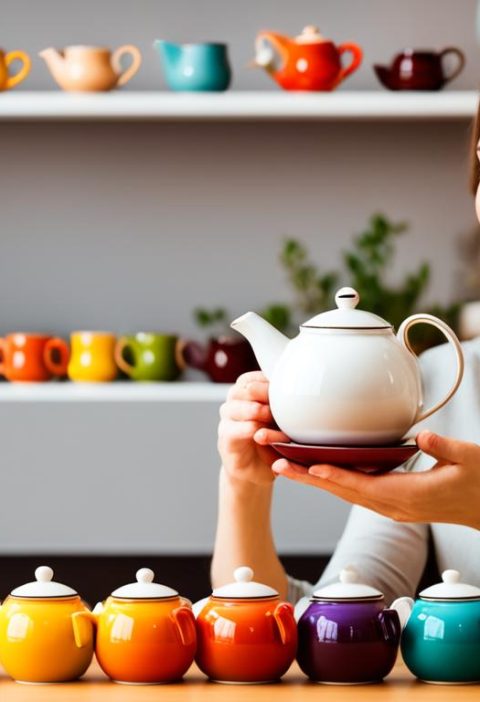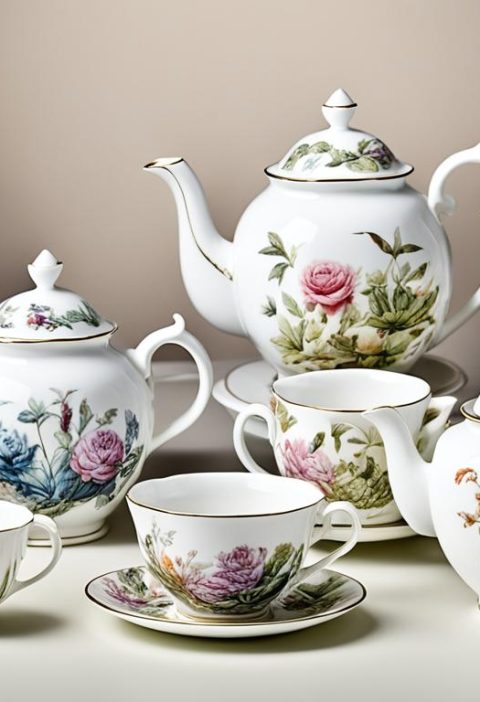Chinese tea sets have a rich history and are known for their intricate designs and motifs. These motifs often reflect traditional Chinese culture and symbolism. From porcelain to pottery, there are various types of tea sets in China, each with its own popular motifs. Let’s explore the most popular motifs on Chinese tea sets.
Popular Motifs on Porcelain Tea Sets
Porcelain tea sets are widely used in China and are renowned for their elegance and beauty. These tea sets showcase various popular motifs that have deep roots in Chinese tea culture and reflect the country’s rich history and artistic traditions.
1. Celadon Patterns
Celadon patterns are among the most favored motifs on porcelain tea sets. These patterns typically feature delicate shades of green and subtle crackle glaze, creating a serene and timeless aesthetic. The use of celadon patterns on tea sets symbolizes harmony and tranquility, which aligns perfectly with Chinese tea culture and the serene experience of enjoying a cup of tea.
2. Painted Porcelain Designs
Painted porcelain designs are another popular motif seen on porcelain tea sets. Skilled artists intricately hand-paint various scenes, such as landscapes, flowers, birds, or mythical creatures, onto the tea sets. These designs add a touch of artistry and storytelling to the tea experience, making each set a unique piece of functional art.
3. White Porcelain Motifs
The elegance of white porcelain motifs on tea sets is unparalleled. The simplicity of white porcelain highlights the purity and clarity of both the tea and the brewing process. These motifs often incorporate delicate floral patterns, calligraphy, or other symbols that hold cultural significance, giving the tea set a refined and sophisticated appeal.
4. Black Porcelain Designs
Black porcelain designs offer a striking contrast to the traditional white porcelain tea sets. These motifs are often bold and dramatic, with intricate patterns that showcase the craftsmanship of the tea set. Black porcelain is prized for its unique aesthetic, and it adds a touch of contemporary flair to the tea-drinking experience.
5. Rice-Pattern Decorations
Rice-pattern decorations are a beloved motif in Chinese tea culture. These motifs feature small, rice-shaped patterns meticulously painted onto the tea set, creating a subtle texture and visual interest. The rice pattern is associated with abundance and prosperity, making it an auspicious choice for tea sets used during special occasions or important ceremonies.
Overall, the motifs found on porcelain tea sets truly exemplify the beauty, history, and cultural significance of Chinese tea culture. Whether it’s the tranquility of celadon patterns, the artistry of painted designs, the simplicity of white porcelain, the boldness of black porcelain, or the auspiciousness of rice-pattern decorations, each motif adds its own unique charm and depth to the tea-drinking experience.
Traditional Motifs on Pottery Tea Sets
Pottery tea sets have a long history in China and are deeply intertwined with traditional tea ceremonies. These sets are not only functional but also carry significant cultural symbolism. The motifs found on pottery tea sets often reflect the natural beauty of China’s landscapes and the elegance of its calligraphy. Let’s explore some of the most popular motifs on these traditional Chinese tea sets.
1. Nature-Inspired Patterns
Many pottery tea sets feature motifs inspired by the natural world. These patterns often include delicate floral designs, symbolizing the harmony between humans and nature. Flowers like the lotus, chrysanthemum, and plum blossom are commonly seen on pottery tea sets, each holding its own symbolism and cultural significance in Chinese tea culture.
2. Calligraphy
Calligraphy is considered a high art form in China, with a rich history that dates back thousands of years. It is no surprise that calligraphic motifs find their way onto pottery tea sets. These motifs may include famous quotes, poems, or even individual Chinese characters that express the beauty of the Chinese written language.
3. Traditional Chinese Symbols
Traditional Chinese symbols with auspicious meanings are often incorporated into pottery tea set designs. These symbols can include dragons, phoenixes, longevity symbols, and the double happiness character. Each symbol carries a unique significance, representing blessings, luck, and prosperity.
4. Hand-Painted Designs on Lacquer Tea Sets
Some pottery tea sets are adorned with intricate hand-painted designs on a lacquer base. These designs showcase the craftsmanship and attention to detail that is characteristic of traditional Chinese tea sets. The motifs can depict scenes from Chinese mythology, historical events, or landscape paintings, adding an artistic flair to the tea set.
As you can see, pottery tea sets offer a glimpse into the beauty and tradition of Chinese tea culture. The motifs found on these sets not only enhance the visual appeal but also deepen the connection to Chinese heritage. Whether you are a tea enthusiast or someone who appreciates fine craftsmanship, a pottery tea set with traditional motifs is a wonderful addition to your collection or a thoughtful gift for someone special.
| Popular Motifs on Pottery Tea Sets | Description |
|---|---|
| Nature-Inspired Patterns | Delicate floral designs symbolizing the harmony between humans and nature. |
| Calligraphy | Famous quotes, poems, or Chinese characters showcasing the beauty of the written language. |
| Traditional Chinese Symbols | Auspicious symbols like dragons, phoenixes, and the double happiness character representing blessings and prosperity. |
| Hand-Painted Designs on Lacquer Tea Sets | Intricate paintings depicting scenes from mythology, history, or landscapes, showcasing the craftsmanship of tea sets. |
Decorated with these motifs, pottery tea sets not only enhance the tea-drinking experience but also elevate it to a cultural experience. So next time you sip a cup of tea from a pottery tea set, take a moment to appreciate the artistry and symbolism that these beautiful sets carry.
Unique Motifs on Glass Tea Sets
Glass tea sets offer a unique and visually captivating experience during the tea-brewing process. Although not as widely used as porcelain or pottery sets, glass tea sets have their own distinctive motifs that showcase the beauty of Chinese tea culture.
When it comes to glass tea sets, the focus is often on transparency and the mesmerizing sight of tea leaves unfurling in the water. The motifs found on glass tea sets are designed to highlight simplicity and elegance, allowing the natural colors of the tea to shine through.
The use of minimalistic patterns on glass tea sets is a common motif. Delicate etchings and engravings of leaves, flowers, or abstract designs add a touch of beauty to the glass surface. These subtle motifs enhance the overall aesthetic appeal of the tea set and create a sense of tranquility during tea time.
Why choose glass tea sets?
Glass tea sets are preferred by some tea enthusiasts for their ability to showcase the visual beauty of the tea leaves as they unfurl. The transparency of glass allows you to observe the colors and movements of the tea, creating a sensory experience that is both relaxing and visually appealing.
Additionally, glass tea sets are versatile and can be used for various types of tea. Whether you prefer delicate floral teas or robust black teas, a glass tea set allows you to appreciate the unique characteristics of each tea.
Choosing the right glass tea set motif
When selecting a glass tea set, consider the motif that resonates with you. Whether it’s a simple etched design or a more intricate pattern, the motif should reflect your personal style and enhance your tea-drinking experience.
For those seeking a modern and minimalist look, a glass tea set with subtle geometric motifs may be the perfect choice. On the other hand, if you appreciate traditional Chinese designs, consider a tea set with delicate lotus or bamboo motifs.
Remember that the beauty of a glass tea set lies in its simplicity, allowing the tea itself to take center stage. Whether you prefer a bold statement piece or a delicate and understated design, there are glass tea sets available in a variety of motifs to suit every taste.
How to care for glass tea sets
Glass tea sets require special care to ensure their longevity and continued beauty. Here are a few tips for maintaining your glass tea set:
- Handle with care: Glass tea sets are fragile, so handle them with gentle hands to avoid any accidental breakage.
- Avoid extreme temperatures: Rapid temperature changes can cause glass to crack or shatter. Avoid pouring boiling water directly into a cold glass tea set or placing it in the freezer.
- Hand wash only: Glass tea sets are best washed by hand using warm water and mild dish soap. Avoid using abrasive cleaners or scrub brushes that may scratch the glass.
- Dry thoroughly: After washing, make sure to dry the glass tea set thoroughly to prevent water spots or stains.
By following these care tips, you can keep your glass tea set looking pristine and ready for many more memorable tea sessions.
Now that you’re familiar with the unique motifs and characteristics of glass tea sets, you can explore the beauty and elegance they bring to your tea-drinking experience.
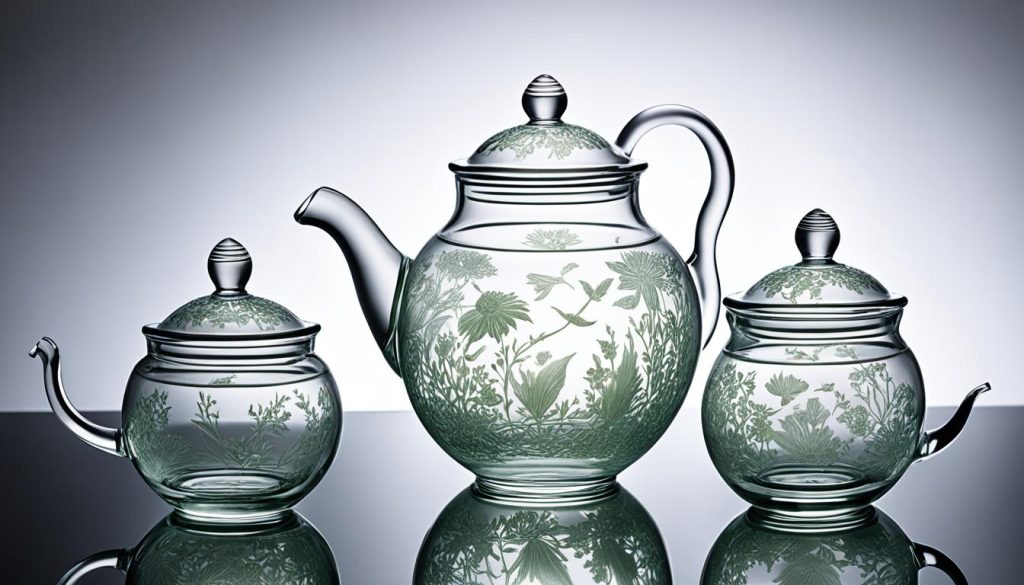
Historical Motifs on Metal Tea Sets
Metal tea sets have a fascinating history in Chinese tea culture, particularly during the Qin and Han dynasties. These sets, although rarely used for brewing tea today, were highly valued for their intricate designs and the symbolism they represented.
What were popular motifs on metal tea sets during ancient times?
During ancient times, popular motifs on metal tea sets included bronze utensils, tin tea caddies, and enamel tea sets. These motifs were characterized by their exceptional craftsmanship and attention to detail, showcasing the creativity and skill of the artisans. The designs often featured intricate patterns, such as filigree work and embossed motifs, which symbolized wealth and prestige.
How did these motifs reflect the cultural significance of metal tea sets?
The motifs on metal tea sets reflected the cultural significance and beliefs of ancient Chinese society. Bronze utensils, for example, were considered a symbol of power and authority, representing the ruling class. The tin tea caddies, on the other hand, were intricately decorated with auspicious symbols and patterns, believed to bring good fortune and protect the tea leaves. Enamel tea sets often featured colorful designs inspired by nature, showcasing the reverence for the environment in traditional Chinese culture.
What role did metal tea sets play in traditional Chinese tea ceremonies?
Metal tea sets played an integral role in traditional Chinese tea ceremonies, serving as a testament to the host’s hospitality and the reverence for the tea-drinking ritual. The intricate motifs on these sets added to the sense of occasion and created a visually stunning atmosphere. The tea sets were carefully chosen to complement the flavors of the tea, ensuring a harmonious experience for the participants.
Why are metal tea sets rarely used for brewing tea in China today?
With the advancement of technology and the availability of more convenient tea-brewing methods, metal tea sets have become less common in modern-day China. Porcelain, pottery, and glass tea sets have gained popularity due to their ability to enhance the aroma and flavor of the tea. However, metal tea sets are still treasured as collector’s items and are often displayed as decorative pieces, paying homage to the rich history and craftsmanship of traditional Chinese tea sets.
What makes metal tea sets unique compared to other types of tea sets?
Metal tea sets have a distinct charm and elegance that sets them apart from other types of tea sets. The material itself, whether bronze, tin, or enamel, adds a touch of luxury and sophistication to the tea-drinking experience. The lasting durability of metal tea sets ensures that they can be cherished and passed down through generations, serving as a reminder of Chinese tea culture’s timeless traditions.
Conclusion
Chinese tea sets are more than just functional vessels for brewing tea; they are true works of art that embody the rich cultural heritage of China. The popular motifs found on these tea sets, whether they are crafted from porcelain, pottery, glass, or metal, showcase the beauty of traditional Chinese designs and symbols. Whether you are a tea enthusiast or simply have an appreciation for the aesthetics of Chinese culture, exploring the motifs on Chinese tea sets can provide a deeper understanding and a greater appreciation for the intricacies of Chinese tea culture.
As you delve into the world of Chinese tea sets, you will discover an array of captivating motifs that tell the stories of the Chinese people and their history. From delicate floral patterns to auspicious symbols, each motif carries its own significance and charm. By familiarizing yourself with popular motifs on Chinese tea sets, you can unlock a treasure trove of cultural meanings that can enrich your tea-drinking experience.
Traditional Chinese tea sets offer a glimpse into the centuries-old tea culture of China. By studying the motifs on these tea sets, you can gain insights into the values, beliefs, and traditions that have shaped Chinese society throughout history. The motifs on Chinese tea sets are not just decorative; they are a window into the artistic expression and cultural identity of the Chinese people.
So, the next time you sip a cup of tea from a Chinese tea set, take a moment to appreciate the intricate motifs and designs adorning it. Let the symbolism and beauty transport you to the heart of Chinese tea culture, allowing you to fully immerse yourself in the traditions and history that have made Chinese tea sets a cherished part of Chinese heritage.
